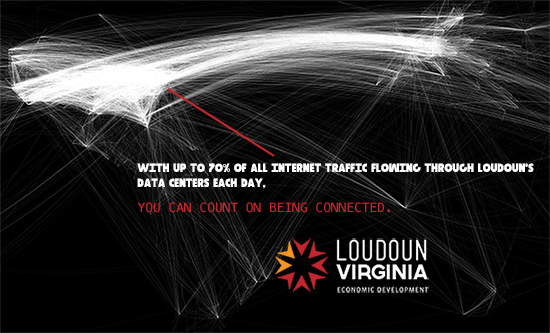by James A. Bacon
There’s a fascinating paradox in the energy economics of data centers. Outsourcing data storage and computing to hyper-scale, hyper-efficient data centers allows businesses to conserve energy and consume less electricity than they would otherwise. But the outsourcing phenomenon increases demand for electricity where the data centers are clustered.
Because so many state-of-the-art data centers have located in Northern Virginia, Loudoun County in particular, and because those data centers are serving customers as far afield as Philadelphia and Charlotte, outsourcing reduces overall electricity demand compared to what it would be otherwise but also concentrates that demand in a localized geographical area.
That paradox might — and I emphasize might because there may be mitigating factors of which I am unaware — undermine the case that Virginia can meet its proposed goals for the Clean Power Plan through energy conservation. Data centers are a major force in driving electricity demand higher for Northern Virginia utilities, primarily Dominion Virginia Power and the Northern Virginia Electric Cooperative.
Here’s how outsourcing promotes energy conservation: Thanks to economies of scale and the pooling of customers with diverse peak demand, data centers can store and process the same amount of data with a single server that most businesses handle with four. Fewer servers translates into less electricity consumed. Moreover, because state-of-the-art servers invest in more efficient cooling systems, their servers sip less energy. Combine the two and the synergy is powerful. “This represents an 88% reduction in carbon emissions for customers when they use AWS vs. the typical on-premises data center,” writes Jeff Barr for the official Amazon blog.
For good reason, environmental groups have targeted data centers as one of the most promising strategies for improving energy efficiency and reducing carbon dioxide emissions in the United States. If all data centers could achieve just half the savings available by attaining industry-leading performance standards, writes Pierre Delforge with the National Resources Defense Council, the country could save 39 billion kilowatt-hours annually — “equivalent to the annual electricity consumption of nearly all the households in the state of Michigan.”
What applies to the nation, however, does not apply to locations where data centers are clustered. Playing on its location on the Northern Virginia fiber network, a tech-savvy workforce and an expedited permitting process, among other advantages, Loudoun County has targeted data centers for economic development. The 60 or so data centers in the county don’t support many jobs — although the jobs are high paying — but they give a massive boost to the tax base. Buddy Rizer, Loudoun’s economic development director, says data centers contribute $70 million a year in local taxes. Better yet, they create very little demand for local services. Every locality in Virginia would love to recruit data centers if it could.
This enters the debate over implementation of the Clean Power Plan because energy efficiency is one of the strategies which the Environmental Protection Agency says states can use to reach their goals for reducing carbon dioxide emissions from its electric utilities. The goals effectively force Virginia power companies to shut down their least efficient coal-fired plants, with lost capacity to be made up through increased use of natural gas, renewables and energy efficiency.
The operative question is how much can Virginia reasonably expect to reduce electricity demand through energy conservation? Environmentalists say that energy efficiency can help reach the Clean Power Plan goals but power companies say the savings will be offset by increased demand from other sources — such as more electric gadgets and appliances, greater use of computer power and data and, eventually, more electric vehicles. State Corporation Commission staff have expressed skepticism that energy conservation can compensate for shutting down coal-fired power plants, especially if Virginia does not build a new nuclear reactor at North Anna, as some environmental groups propose.
A new study shows that investments in household energy conservation may be far less cost-effective than thought. “The findings suggest that the upfront investment costs are about twice the actual energy savings,” states a University of Chicago Study, “Do Energy Efficient Investments Deliver? Evidence from the Weatherization Assistance Program.” “Even when accounting for the broader societal benefits of energy efficiency investments, the costs still substantially outweigh the benefits; the average rate of return is approximately -9.5% annually.”
Can conservation investments in a business setting like building automation or data outsourcing, where the ROI can be much higher, take up the slack? Perhaps it can on a national level, but it’s harder to make the case in Northern Virginia, where data centers are, in effect, sucking up electricity demand from other parts of the country, even the world.



